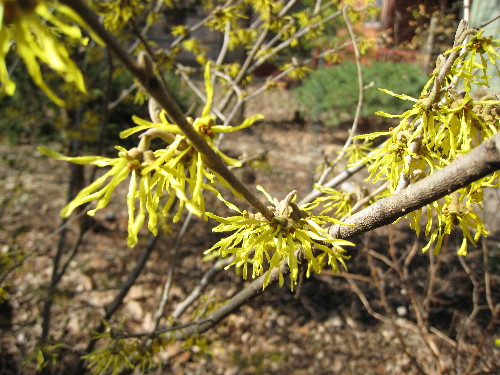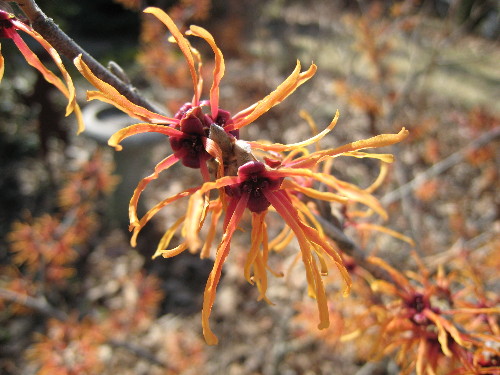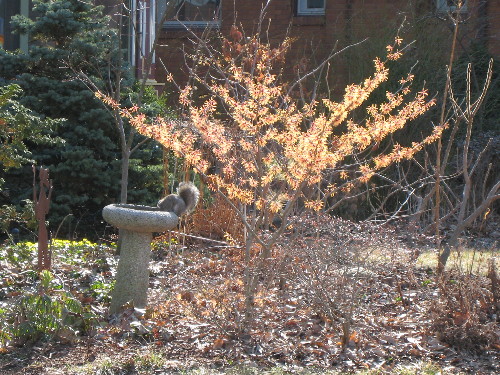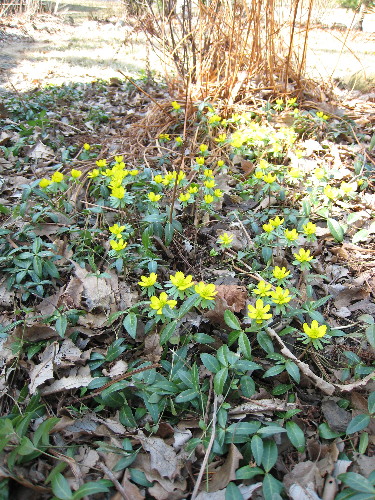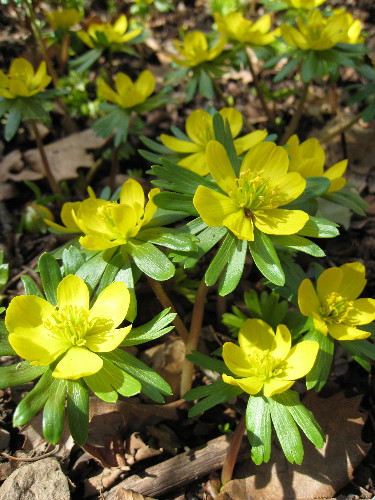Wind Chimes Live Music composed by Nature. [audio:https://glitteringmuse.com/wp-content/uploads/2010/10/windchimes.mp3|titles=windchimes]
Category Archives: Garden and Nature
Spring Flowers
Summer, Haircuts and Basil
I had a haircut today. I love the feeling of the scissors snipping near my ears and the sheers vibrating against my head. It’s the most relaxed I’ve been in weeks. I realize that I’ve missed Summer, being so distracted with my career crisis.
I barely write here anymore, especially since the arts culture crisis began in Columbus in January, threatening my job of 19 years. I moved here to play in the Columbus Symphony. It was a thriving orchestra back then, up and coming. We had some great years with Alessandro Siciliani; a trip to Carnegie Hall, several recordings. Now all that is threatened.
An orchestra is like a tree. It takes a long time to grow and develop. It’s unique shape and habits are like no other tree. It offers relief from the rigors of the day under its branches.
I have an old Chinquapin Oak growing next to my house. It is at least 150 years old. It’s branches grow over two houses. When I had a large addition put on the back of my house, I had a special “floating” foundation put in, with three large piers upon which the room is built. I hired a tree specialist to dig the holes, so as not to disturb the roots. She used a large air gun to blast the soil away, revealing any roots, which she cut very carefully. Luckily, there were no really important arteries in any of the three 5 ft deep holes.
So it is with an orchestra. In the attempts to “stabilize” the organization financially, those who perhaps intended “progress” have instead damaged, perhaps irreparably, the Columbus Symphony. Several players have left, and more will leave in the next few months.
I planted three tomato plants in a pot in my driveway, one of the few places unshaded by the huge oak. Those three tiny little plants are now huge, rambling five feet high and flopping in every direction. The first tomatoes are almost ripe. (I planted them late) I watched the progress of those weedy plants each time I walked past them. I also planted a few dozen Basil plants, which are now robust bushes full of fragrant leaves. Tomato and Basil plants are the epitome of Summer! Their pungent smell and profuse vigor capture the very essence of Summer’s fecund process. So much happens in a garden during the growing season.
And I realize that, like the tomato plants, I’ve also been productive. I’ve had to adjust to the possibility of being unemployed for awhile until either the orchestra is resurrected or I gain another job. (akin to winning the Olympics, in other words a rare and difficult accomplishment) I’ve cleared out three rooms in my house and rented them out. The new house-mates have settled in and, in addition to providing me with income, are turning out to be excellent additions to my home.
I had a huge garage sale a few days ago. I seized the opportunity while clearing rooms out to sort through and eliminate superfluous stuff. I sold not only house items, but many plant divisions from my garden, mainly Hostas and Daylilies. I made $350 on the sale. And my life feels a bit lighter.
I am teaching more private students, and enjoying the process of initiating young minds to music’s complexity, especially since I have few performances to worry about.
Along with other musicians in the orchestra, I helped organize several very successful concerts to keep our orchestra in the public eye.
So, as I look at the garden through the large window behind my computer, I see that the garden’s progress didn’t happen alone. I now see how much I have grown, in self-reliance, confidence and resilience, during the past few months.
At the end of Summer, Fall’s harvest is the reward for hard work. Perhaps during the approaching Fall season, my hard earned personal growth and actions will pay off. I have to hope and be optimistic.
Luscious Spring
Aching Cold Morning
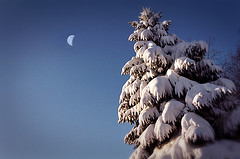 He awoke, as usual, way too early, around 7 AM. Being a night person, that meant he only got 4-5 hours of sleep, not quite enough. But it happened often to him. And since optimism wasn’t one of his surpluses, a heaviness filled him seeing dawn’s early light.
He awoke, as usual, way too early, around 7 AM. Being a night person, that meant he only got 4-5 hours of sleep, not quite enough. But it happened often to him. And since optimism wasn’t one of his surpluses, a heaviness filled him seeing dawn’s early light.
He felt the warm little body of Punky, his oldest cat, next to him. The thermostat was set to go down to 55 at night to save energy, so Punky, now almost 18, always slept as close as possible to his body to keep warm.
Instead he found Perlin, his younger Siamese, in Punky’s place. He petted Perlin, and asked him what he had done with Punky, whose spot he had taken. Perlin just looked at him with that look cats give which can mean anything. “Punky, who?” or “I was just asleep, why are you asking me?” Rather than roll over to fall asleep until a more civilized hour, he got up to see where Punky was.
The furnace had kicked on to heat the house up, as it was set to do about this hour. But the air was still burning cold to his near naked skin. He had almost no fat on his body, so the cold went right through to his bones as he descended the stairs in boxer shorts.
He found Punky sitting on one of the spindly café chairs by the back window, like a little monk folded up in a peaceful meditation pose. At first he seemed lonely to Dorn. After all, if he were human, old as an oak sitting alone in a cold room, he would seem lonely. But then he realized Punky wasn’t too bad off. The chair he was sitting on was right over a large heating vent, which was now blasting nice, cozy warm air, and would be for at least the next half hour.
He approached Punky and tried to pet him, but he pulled away. He rose out of his meditative pose and turned to face the picture window behind him. Dorn’s eyes followed.
The morning was a brittle white icing on a cake which had sat out for a day too long. The fresh snow from the day before had hardened under a bitter blanket of night cold. Tracks and various marks held account of the previous day’s activities. He could see where he had stepped to sweep the back steps and where he walked through the garden to shake the piles of snow off the evergreen branches to keep them from collapsing under the its weight. His car had made two crystalline geometric tracks into the now closed garage.
In the sky, a sharp slice of thin moon pierced the aching dawn. He was reminded of the movie he had seen the night before on network TV, The Day After Tomorrow, about how global warming could create terrible mega-storms which might, in one scenario, bring down the crushing cold of space to earth’s fragile surface, freezing everything on it. But this sky had the promise of life-giving warmth just beyond its horizon, a glow to which the moon pointed, and which Punky faced through the window.
Through the double pane glass he heard a bird chirp, one piercing peep. It was still gray enough to hide clear sight of the scene outside. Most birds were still asleep, he figured. He found the bird, a female cardinal, her brownish red blending with the twisted sticks of the wisteria clamoring over the garage.
Then he noticed that the bird feeder, a covered rectangular platform like a little house atop a six foot pole, was empty. Though he filled it daily they ate it as fast as he could fill it. He knew a swarm of birds would soon be fluttering around looking for breakfast on that feeder. They relied on it, especially when snow covered the ground.
The cardinal swooped to the feeder and pecked at it. It was only ten feet from the back window. Half naked and singed with cold, Dorn stood there and watched. It looked so cold out. But he knew he had to fill that feeder. He couldn’t go back to bed with the lingering thought of those cold birds.
He went upstairs to cover his bony body with a terrycloth robe and bedroom slippers. Punky continued staring out the back window as Dorn opened the back door. As he broke beyond the wall of heat coming from the vent by the door, his skin recoiled against the heat sucking molecules of dense lifeless air. If he had fur, it would stand on end to conserve warmth. Instead, the benign terrycloth did little to help. Luckily the garage, where the birdseed was stored, wasn’t more that twenty feet away.
After dumping a bowl full of seed on the feeder, he scurried back indoors. Punky ignored his shivering entrance and continued to peer out the window. Within minutes the show began as the light rose from within the dead cold snow. Dozens of birds appeared from the dormant scenery around the garden. The feeder became grand central station, with flights arriving and departing in a continuous stream from the hub to all the bushes and trees around the garden.
A lone squirrel, covered in snow like a little kid out in it for the first time, dug for scrap seed in the frozen icing as patiently as a scholar seeking a cure for cancer. All this activity filled Dorn’s mind against the leering void of the the approaching day. Sharp rays of sun now splintered the aching cold morning into pieces he could grasp and hold onto.
Punky turned around to gaze at him with a kitty kiss, eyes slowly closing and opening.

